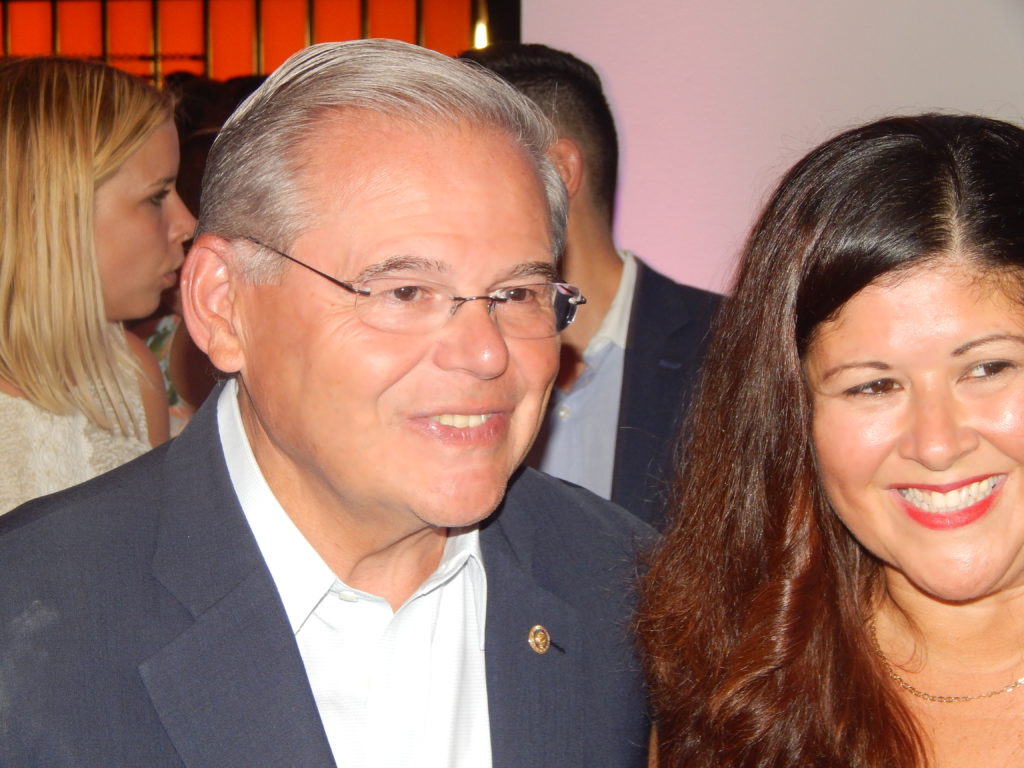Naturally Combative, Menendez More Than Most Required 'Friends' in Politics

The analysis of Senator Bob Menendez's (D-NJ) corruption trial revolves around the precise nature of Menendez's relationship with Florida Doctor Salomon Melgen. Those questions cut to the very definition of corruption, as the federal government's case hinges on an argument that Menendez traded government services for trips and other illicit gifts.
From the beginning, Menendez said Melgen was a friend.
That word means a lot to Menendez, who rose from the trough of Hudson County politics with a combination of guile, wits, and his very underrated ability to forge and maintain critical political alliances, which become useful in war. The concept of friendship means more to the senator than it means to most people in the New Jersey political game, who come and go, who burrow into the closest swamp and stay there for years, half submerged, who calculatedly avoid fights as a matter of survival. A New Jersey politician once admonished an underling who bragged of meeting a "friend" in the political world. "They aren't your friends," the pol snapped. "They are just people you meet in politics."
Most people in this game hesitate to use the word "friend" to describe an ally, preferring to carefully ascertain a level of trust they feel with another, and stopping short of ascribing the more personalized comfort zone of friendship. Then again, most people in establishment politics don't routinely undertake fights as a way of defining and distinguishing themselves and moving upward out of their parochial beginnings to become powerful chairman of the Senate Foreign Relations Committee.
The senior U.S. Senator from New Jersey - who today sat in a federal courtroom listening to the government presenting its corruption case against him - is the opposite of risk-averse political people. Menendez fundamentally believes that fighting on critical issues produces not only benefits for a community of need seeking vital representation - but also personal political advancement. Others mostly wait their turn, or rely on likeability to - eventually, they hope - get up the party food chain. The naturally combative and impatient Menendez survives politically by fighting.
In politics, fighters require - at the very least - allies. The tougher the fight, the more invested become the fighter's allies, if they want to remain in his circle. If they can't stand up to the conditions of a fight, the fighter gets rid of them. In New Jersey politics, the political bosses require party machines made up of handpicked people who are loyal, who will act in concert when they receive an order. They rely on fundraising muscle of men and women they have known for many years. They rely on political action groups and local residents and patronage.
Menendez defined himself early as the young man who bucked the political boss Bill Musto of Union City by wearing a bulletproof vest, and he maintained that reputation with hard-nosed political battles in Hudson to keep the Cuban American population in the Democratic Party column throughout the 1980s. He maintained it too with his stance against the Iraq War when most others in the New Jersey delegation supported it, his cut-out from the Obama Administration on Cuba and the Iran Nuclear Accord, and his opposition to President Donald J. Trump on the federal revocation of DACA. While assessing the international conditions of war and peace he simultaneously pruned the Democratic Committee in County of less than useful local and countywide alliances. Over the course of three-plus decades, he built himself into that rare New Jersey political hybrid, who prefers to be the imposing overlord rather than endure the presence of one hovering over him while he votes.
He became an elected official and a political boss.
All those actions required preparation for real blow back from those powerful entities offended by Menendez's stances. So he had a strong circle of friends. Now up against it, his footing uncertain, his political career on the line, he makes the case that Melgen was one of such people, a friend, who might have directed $750,000 in campaign contributions to Menendez and given him rides on his private jets with or without the senator's assistance to help Melgen avoid paying $8.9 million for overbilling Medicare, or using his influence to get one of Melgen's girlfriends and her sister access to America after their visas were denied. The senator has his loyal defenders, who like his defense attorney point to precedent for innocence in the similar corruption trial of former Virginia Governor Bob McDonnell. And yet, the Menendez case seems like a very heavy lift to those who watch the New Jersey political game. While no one has outright made a declaration or a move out of deference to the senator, politics-watchers see the potential for an opening when Menendez faces reelection next year.
The Democratic Party-dominant state is very roughly split between North and South, with the North having lost significant power when the Northern-based Menendez endured the charges he now hopes to stare down. The South may find itself in position to make a move on the statewide seat, in exchange for the North assuming the state senate presidency the south now controls. Those discussions continue right now behind the scenes of the trial, and intensify as New Jersey nears 2018, much to the chagrin of Menendez.
If he survives, he will remember those friends who stood with him.
And those who didn't.





